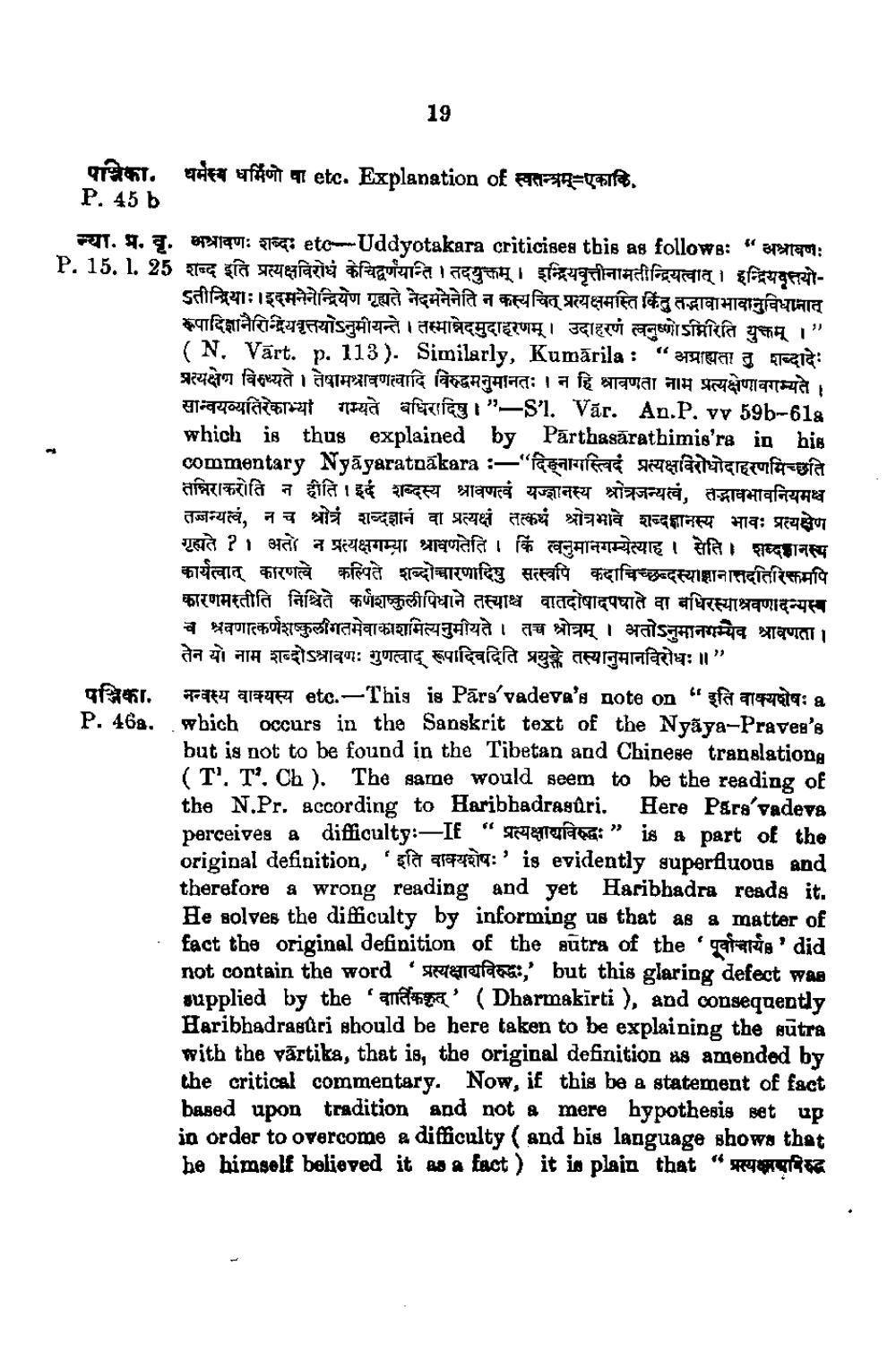________________
19
पत्रिका. धर्मस्व धर्मिणो वा etc. Explanation of स्वतन्त्रम् एकाकि, P. 45b न्या. . वृ. अश्रावणः शब्दः etc--Uddyotakara criticises this as follows: " अश्रावणः P. 15. 1. 25 शन्द इति प्रत्यक्षविरोध केचिद्वर्णयान्ति । तदयुक्तम् । इन्द्रियवृत्तीनामतीन्द्रियत्वात् । इन्द्रियवृत्तयो
ऽतीन्द्रियाः।इदमनेनेन्द्रियेण गृह्यते नेदमनेनेति न कस्यचित् प्रत्यक्षमस्ति किंतु तद्भावाभावानुविधानात् रूपादिज्ञानैरिन्द्रयवृत्तयोऽनुमीयन्ते । तस्मान्नेदमुदाहरणम्। उदाहरणं त्वनुष्णोऽपिरिति युक्तम् ।" ( N. Vart. p. 113). Similarly, Kumarila: “अग्राह्यता तु शब्दादेः प्रत्यक्षेण विरुध्यते । तेषामश्रावणत्वादि विरुद्धमनुमानतः । न हि श्रावणता नाम प्रत्यक्षेणावगम्यते। सान्वयव्यतिरेकाभ्यो गम्यते बधिरादिषु।"-Sl. Var. An.P. vv 59b-61a which is thus explained by Pārthasărathimis're in his commentary Nyayaratnakara :-"दिङ्नागस्त्विदं प्रत्यक्षविरोधोदाहरणमिच्छति तन्निराकरोति न हीति । इदं शब्दस्य श्रावणत्वं यज्ज्ञानस्य श्रोत्रजन्यत्वं, तद्भावभावनियमश्व तजन्यत्वं, न च श्रोत्रं शब्दज्ञानं वा प्रत्यक्षं तत्कथं श्रोत्रमावे शब्दज्ञानस्य भावः प्रत्यक्षेण गृह्यते ? । अतो न प्रत्यक्षगम्या श्रावणतेति । किं स्वनुमानगम्येत्याह । सेति। शब्दज्ञानस्प कार्यत्वात् कारणत्वे कल्पिते शब्दोच्चारणादिषु सत्स्वपि कदाचिच्छब्दस्याज्ञानात्तदतिरिक्कमपि कारणमस्तीति निश्चिते कर्णशष्कुलीपिधाने तस्याश्च वातदोषादपघाते वा बधिरस्याश्रवणादन्यस्य च श्रवणात्कर्णशष्कुलीगतमेवाकाशमित्यनुमीयते। तच श्रोत्रम् । अतोऽनुमानगम्यैव श्रावणता।
तेन यो नाम शब्दोऽश्रावणः गुणत्वाद् रूपादिवदिति प्रयुक्ते तस्यानुमानविरोधः॥" पञिका. नवस्य वाक्यस्य etc. This is Pars vadeva's note on " इति वाक्यशेषः । P. 46a.
which occurs in the Sanskrit text of the Nyāya-Pravea's but is not to be found in the Tibetan and Chinese translationa ( T'. T.Ch ). The same would seem to be the reading of the N.Pr, according to Haribhadrasûri. Here Para'vadeva perceives a difficulty:-If “ प्रत्यक्षायविरुद्धः" is a part of the original definition, 'इति वाक्यशेषः' is evidently superfluous and therefore a wrong reading and yet Haribhadra reads it. He solves the difficulty by informing us that as a matter of fact the original definition of the autra of the 'पूर्वाचार्य' did not contain the word 'प्रत्यक्षायविरुद्धा, but this glaring defect was supplied by the 'वार्तिककृत् ' ( Dharmakirti ), and consequently Haribhadrasûri should be here taken to be explaining the sūtra with the vārtika, that is, the original definition as amended by the critical commentary. Now, if this be a statement of fact based upon tradition and not a mere hypothesis set up in order to overcome a difficulty ( and bis language shows that he himselk believed it as a fact) it in plain that “प्रत्यक्षायाविरुद्ध




